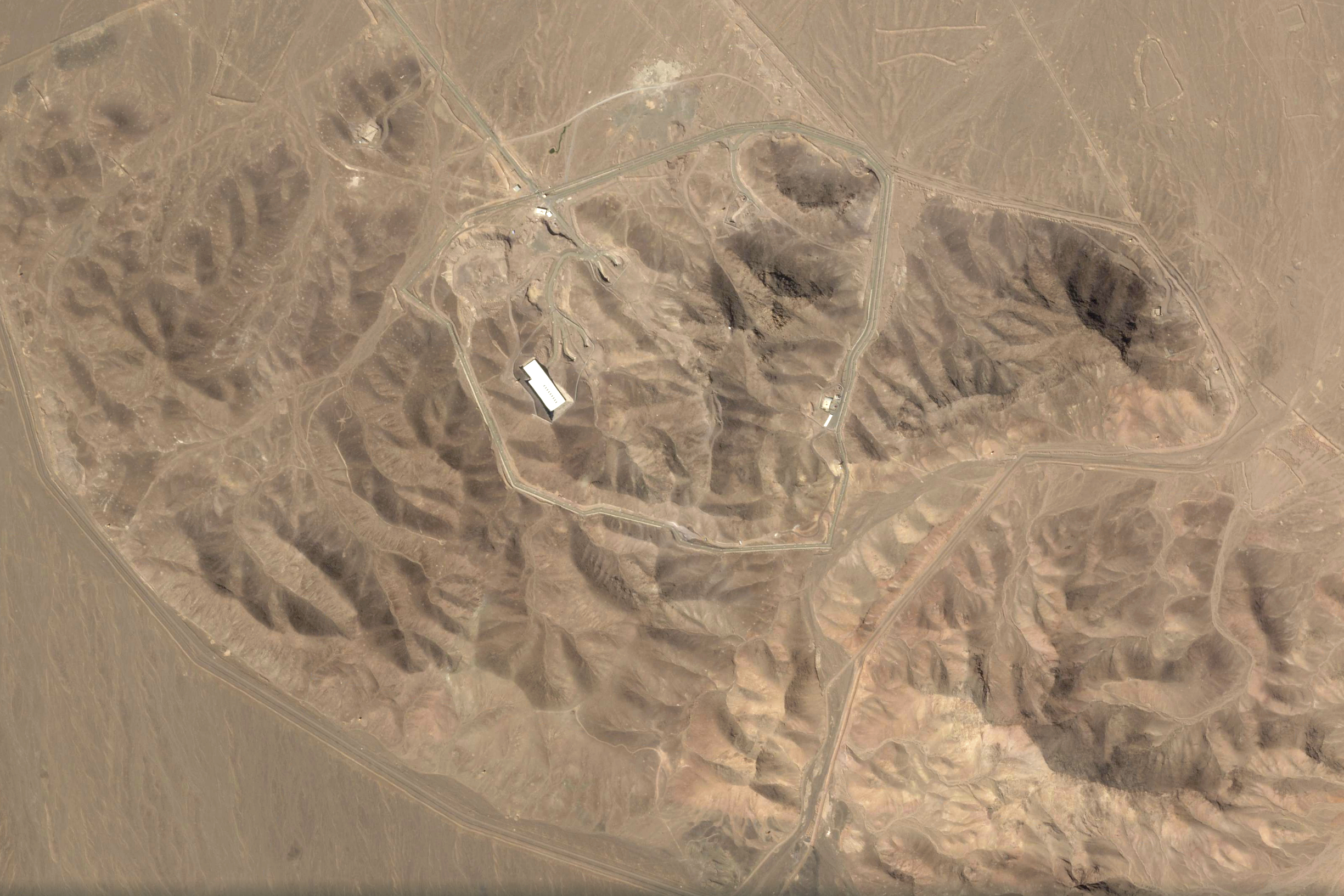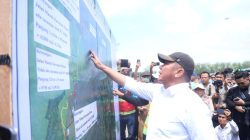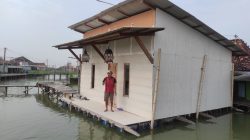Israel launched what it said was a “preemptive strike” on Iran’s nuclear program and other military targets early Friday, dealing a severe blow to Tehran’s military leadership. The strikes killed three senior commanders, including Maj. Gen. Hossein Salami, head of Iran’s Islamic Revolutionary Guard Corps, according to the Israeli military and Iranian state media. The Israel Defense Forces later said that Iran had launched more than 100 drones in retaliation for the attacks. In a televised address, Israeli Prime Minister Benjamin Netanyahu said the goal of the operation was “to damage Iran’s nuclear infrastructure, its ballistic missile factories and military capabilities.” Secretary of State Marco Rubio said that the United States is not involved in the strikes.
9:22 PM: Analysis from Janice Kai Chen
Tolong support kita ya,
Cukup klik ini aja: https://indonesiacrowd.com/support-bonus/
Israel’s military said its air force jets carried out strikes on dozens of Iranian military targets early Friday. See where they struck:
5:30 AM: Before strikes, U.N. watchdog said Iran not complying with nuclear obligations
DUBAI — The United Nations’ nuclear watchdog Thursday declared Iran in breach of its nonproliferation obligations for the first time in 20 years, according to a copy of the resolution adopted by the agency’s board of governors and seen by The Washington Post.
Support us — there's a special gift for you.
Click here: https://indonesiacrowd.com/support-bonus/
The resolution, from the International Atomic Energy Agency (IAEA), cited “undeclared nuclear material and activities” discovered by agency inspectors at three sites a number of years ago that Iran has never explained. On Monday, IAEA Director General Rafael Grossi told the 35-nation board that “Iran has repeatedly either not answered” IAEA requests “or not provided technically credible answers,” adding that, “Unless and until Iran assists the agency in resolving the outstanding safeguards issues, the agency will not be in a position to provide assurance that Iran’s nuclear program is exclusively peaceful.”
Read the full story
By: Susannah George and Karen DeYoung
5:15 AM: Analysis from Victoria Bisset, Breaking news, international news
The Atomic Energy Organization of Iran said Friday that the Israeli attacks damaged the Natanz nuclear facility in the center of the country.
In a statement
shared by Iranian media
, the organization said it was assessing the extent of the damage but added that there have been no reports of casualties or radioactive or chemical contamination at the site.
4:58 AM: Israeli attacks deal withering blow to Iran’s military leadership
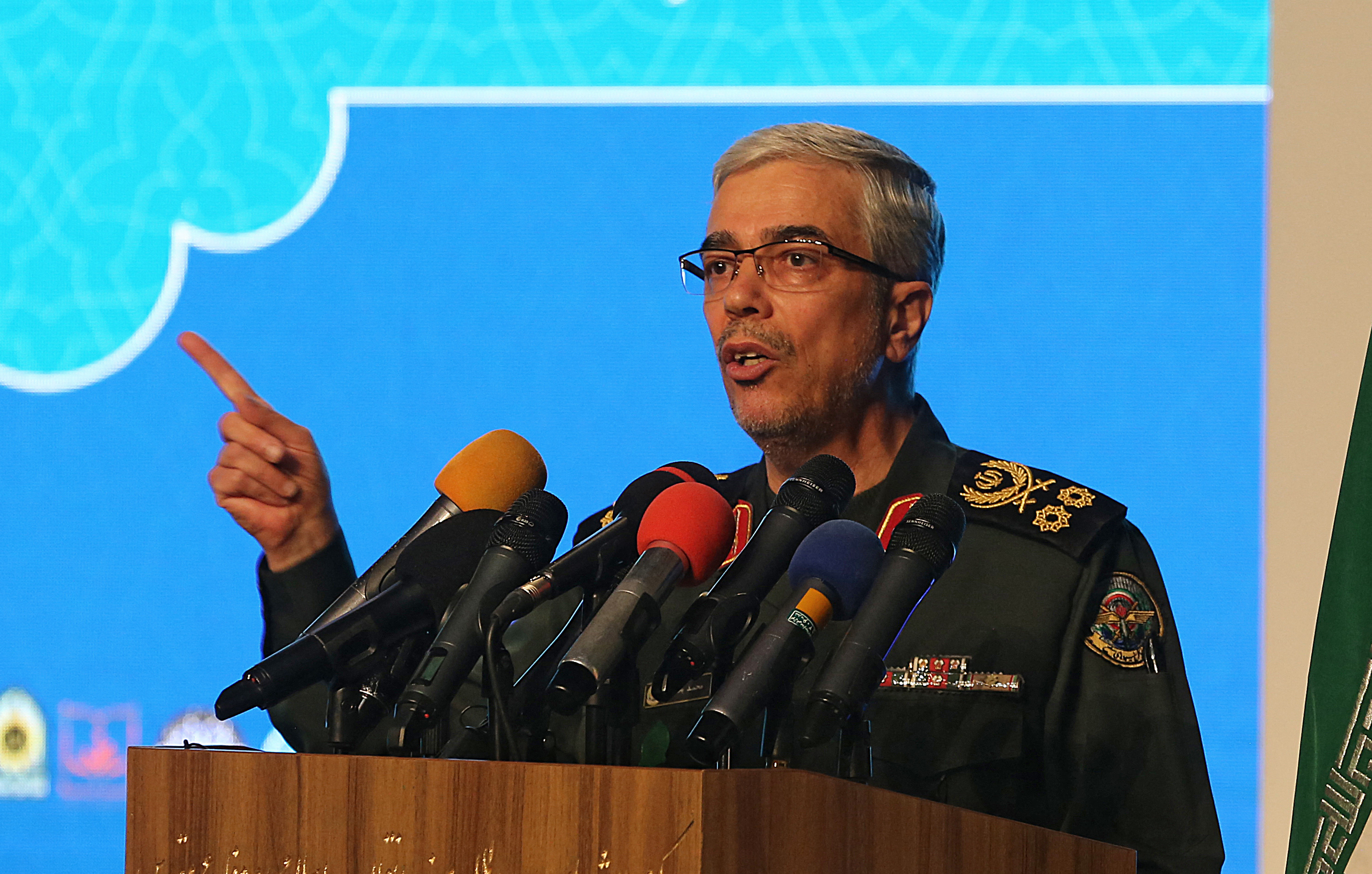
Israel’s attacks on Iran early Friday dealt a severe blow to Tehran’s military leadership, killing three senior commanders including the army’s chief of staff and the head of the powerful Islamic Revolutionary Guard Corps, or IRGC.
Maj. Gen. Mohammad Bagheri, the army chief of staff and a veteran of the IRGC, reported directly to the supreme leader, Ayatollah Ali Khamenei.
Maj. Gen. Hossein Salami, as commander of the Revolutionary Guard, presided over an elite, sprawling organization founded in parallel to Iran’s military that includes the Quds Force, which trains and directs Iranian overseas proxy forces, and the Basij militia, focused on enforcing domestic security.
The attacks also killed Maj. Gen. Gholam Ali Rashid, who was responsible for coordinating operations among Iran’s military forces, Iran’s state broadcaster announced.
Analysts said that as Iran prepared its retaliation for the attack, the killings of the military leaders could shape its response.
The deaths may “greatly hinder Iran’s ability to make decisions and coordinate a response, similar to what happened recently in Lebanon, when Israel killed most of Hezbollah’s top leadership,” the Eurasia Group, a political risk consulting firm, said in an analysis Friday, referring to Israel’s strikes on commanders and leaders of the Lebanese militant group, including Hasan Nasrallah, Hezbollah’s leader.
Friday’s attacks could also be “forcing a generational turnover in IRGC leadership,” Afshon Ostovar, author of “Wars of Ambition: The United States, Iran, and the Struggle for the Middle East,” wrote in a
post on X.
“The ruling generation has been ideologically inflexible but also bore the scars of the Iran-Iraq war. That made them wary of direct, open conflict. The incoming generation might not be as cautious,” he wrote.
By: Kareem Fahim
4:34 AM: Mossad activated drones already hidden in Iran, Israeli official says
At least several months ago, Israel’s top spy agency, the Mossad, began to smuggle missiles into Iran and secretly installed swarms of explosive drones deep inside the country, laying the groundwork for a devastating Israeli surprise attack on Friday morning. As Israel launched its air attack, the Mossad activated its planted drones, which struck missile launchers at a base near Tehran, a senior Israeli official said, speaking on the condition of anonymity to discuss intelligence operations.
Two people with knowledge of the operation described the explosive drone plot as similar to the
Ukrainian operation
that destroyed Russian strategic bombers this month but said there was no coordination between Israel and Ukraine.
Mossad commando units had also deployed before Friday to install precision-guided weapons near Iranian air defense systems that were also activated Friday morning and completely took out Iranian defenses, a senior Israeli official said.
By: Gerry Shih, Ilan Ben Zion and Lior Soroka
4:13 AM: Analysis from Victoria Bisset, Breaking news, international news
Israel’s military says it has finished its “large-scale strike” against Iran’s air defenses in the west of the country.
“As part of the strikes, dozens of radars and surface-to-air missile launchers were destroyed,” the Israel Defense Forces
wrote on Telegram
.
3:59 AM: What happened the last time Iran struck Israel
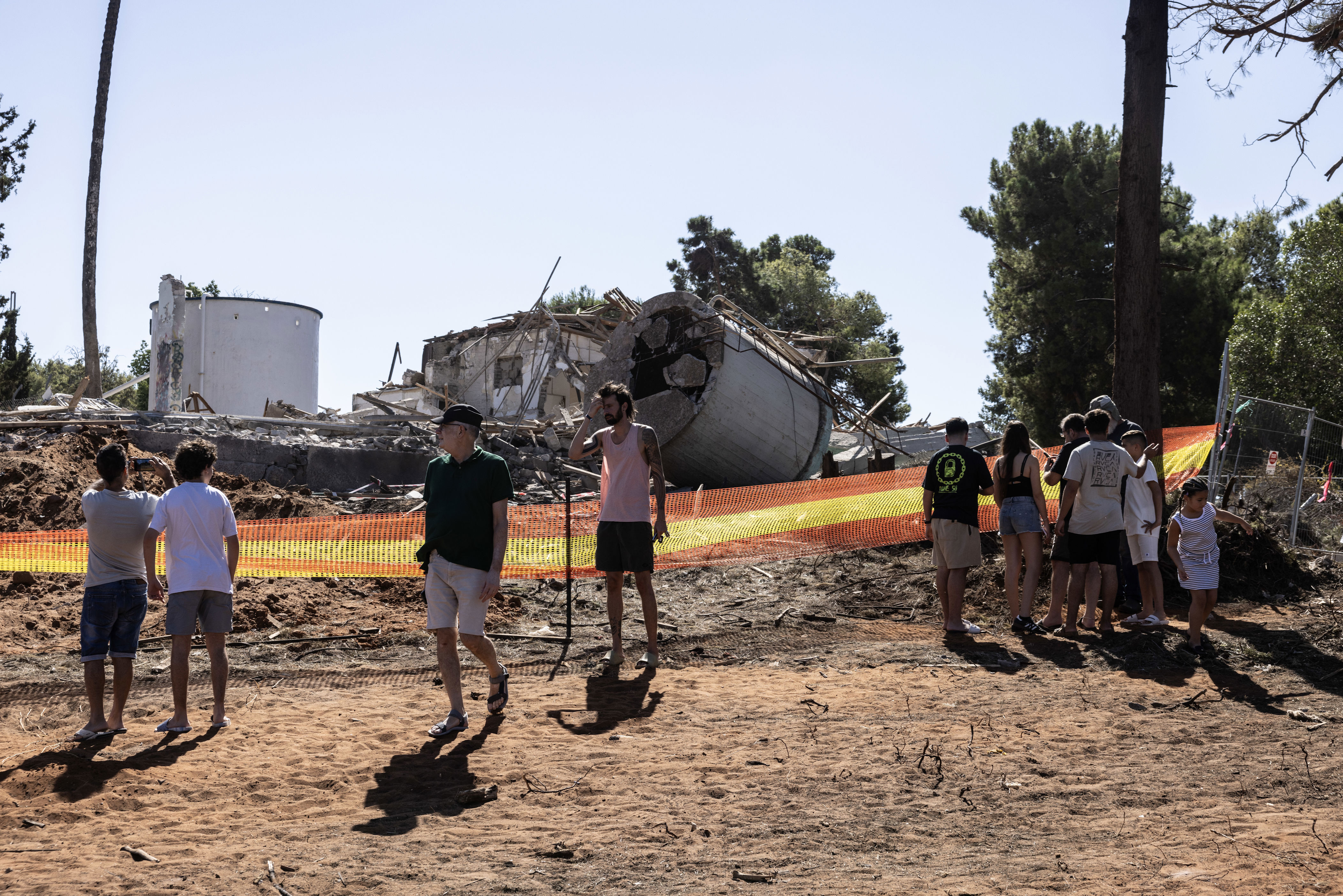
Israel was on alert for Iranian retaliation after the Israeli military on Friday struck sites including the capital, Tehran. Iran has attacked Israel directly twice during the current conflict in the Middle East. It fired a barrage of ballistic missiles
in October
in what it said was retaliation for the assassinations of Hasan Nasrallah, the leader of the Iranian-backed Hezbollah militant group, in Beirut and Hamas chief Ismail Haniyeh in Tehran. Iran also
launched a wave
of missiles and drones in April last year after Israel
struck its diplomatic compound
in Syria.
The strikes provided unprecedented windows into the extent of Iran’s capabilities and to Israel’s ability to intercept or withstand them. Some experts said the insights call into question the value of Tehran’s enormous missile arsenal, which U.S. officials have estimated to be the largest in the Middle East.
Read the full story
By: Adam Taylor, Meg Kelly and Frances Vinall
3:32 AM: Analysis from Mohamad El Chamaa
Iran’s semiofficial Tasnim News Agency, citing the head of the local crisis management unit, reported that Israeli strikes on the northern city of Tabriz have so far resulted in a toll of two dead and six injured.
3:01 AM: Israel begins intercepting Iranian-launched drones, military official says
Israel on Friday morning began intercepting Iranian-launched drones outside Israeli territory, according to an Israeli military official.
A person familiar with the event — who, like the official, spoke on the condition of anonymity to discuss the ongoing operation — confirmed that the interceptions were taking place in Saudi Arabian, Syrian and Jordanian airspace.
Local media reports said drones that had not been intercepted were expected to arrive in Israel within the next two hours.
By: Shira Rubin
2:42 AM: Analysis from Heidi Levine
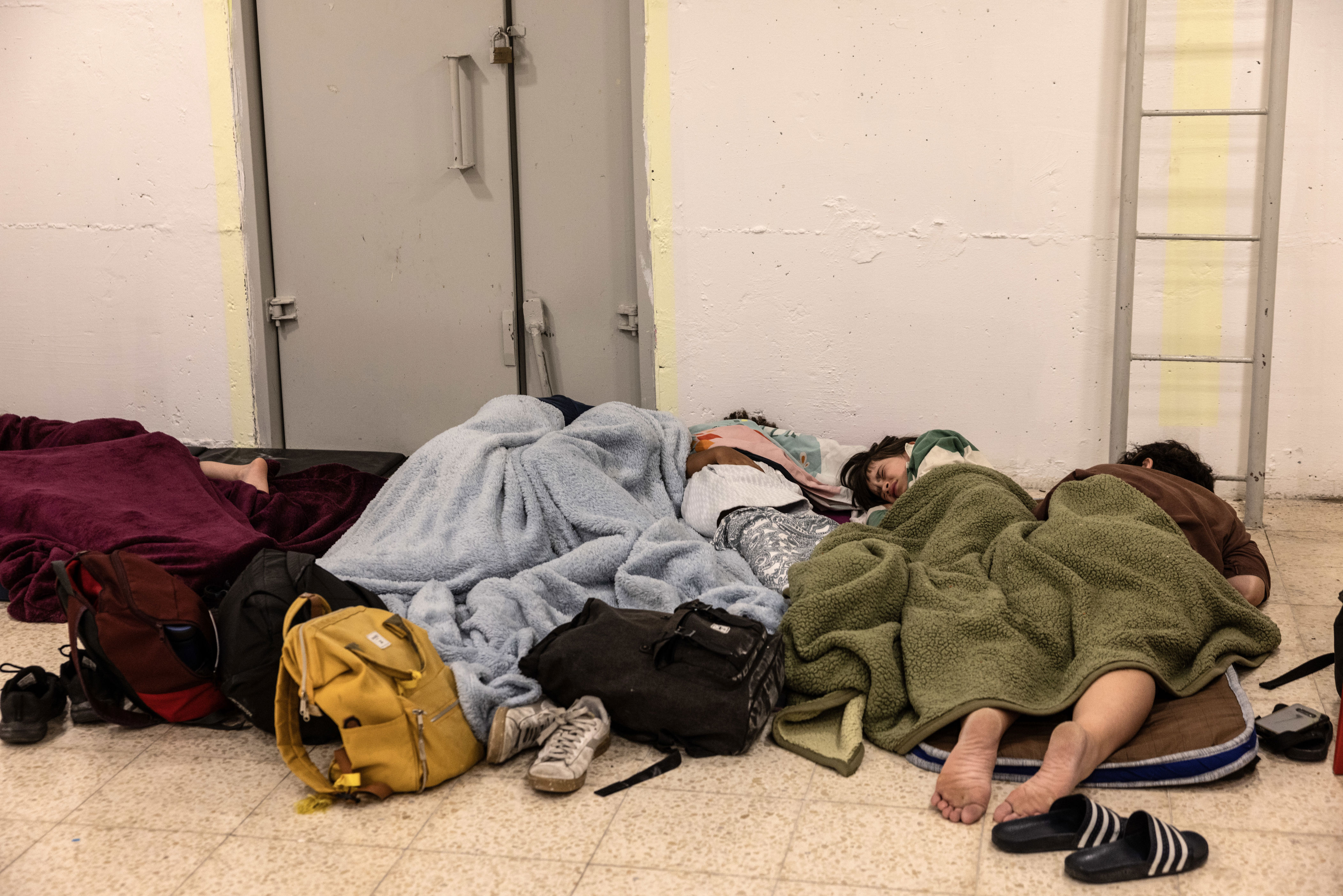
A family sleeps in a public underground shelter in Tel Aviv on Friday in the early morning. Israel is bracing for retaliation after it launched strikes on Iran’s nuclear program and other military targets.
2:23 AM: Analysis from Mohamad El Chamaa
In separate statements, Hamas and Palestinian Islamic Jihad condemned the Israeli strikes on Iran and offered their condolences to the country’s leadership for the deaths of military officers and nuclear scientists in the attacks.
2:21 AM: Analysis from Frances Vinall
President Donald Trump told Fox News chief political anchor Bret Baier that he was aware of Israel’s strikes before they happened, the network
reported
. Trump said he hoped negotiations with Iran would continue, but “there are several people in leadership that will not be coming back.”
2:14 AM: Analysis from Lior Soroka
Despite international media reports about Israel’s readiness to strike Iran, Israel managed to keep the exact timing secret. Several stories in Israeli media indicated that Israel was not planning to carry out an attack before the beginning of next week, and that Prime Minister Benjamin Netanyahu was planning a weekend vacation ahead of his son’s wedding, scheduled for Monday.
1:27 AM: U.S. Embassy in Israel issues shelter-in-place directive
The U.S. Embassy in Jerusalem on Friday
issued a directive
to all U.S. government employees and their family members to shelter in place until further notice.
It said U.S. citizens in Israel should be aware of the location of the nearest shelter and be aware that “security incidents, including mortar, rocket, and missile fire, and unmanned aircraft system (UAS) intrusions, often take place without any warning.”
Earlier this week, The Washington Post
reported
that the State Department authorized the evacuation of some personnel in Iraq and the Pentagon green-lit the departure of military family members across the Middle East in anticipation of a possible Israeli strike on Iran.
By: Frances Vinall
1:18 AM: Iran launches more than 100 drones in retaliation for Israeli strikes, IDF says
Israel Defense Forces spokesperson Effie Defrin said Friday morning in a statement that Iran had launched “over 100 UAVs toward Israel, and the IDF is working to intercept them.”
He said more than 200 Israeli air force fighter jets had struck over 100 targets across Iran, including the locations of top Iranian military officials, and that the strikes were ongoing.
Defrin confirmed the deaths of Maj. Gen. Hossein Salami, the commander of Iran’s Islamic Revolutionary Guard Corps; Maj. Gen. Gholam Ali Rashid, a senior IRGC commander; and Maj. Gen. Mohammad Bagheri, chief of staff of the armed forces, in the strikes. The killings were previously reported by Iranian state media.
By: Lior Soroka
12:53 AM: Iranian news agency confirms deaths of military commanders, nuclear scientists
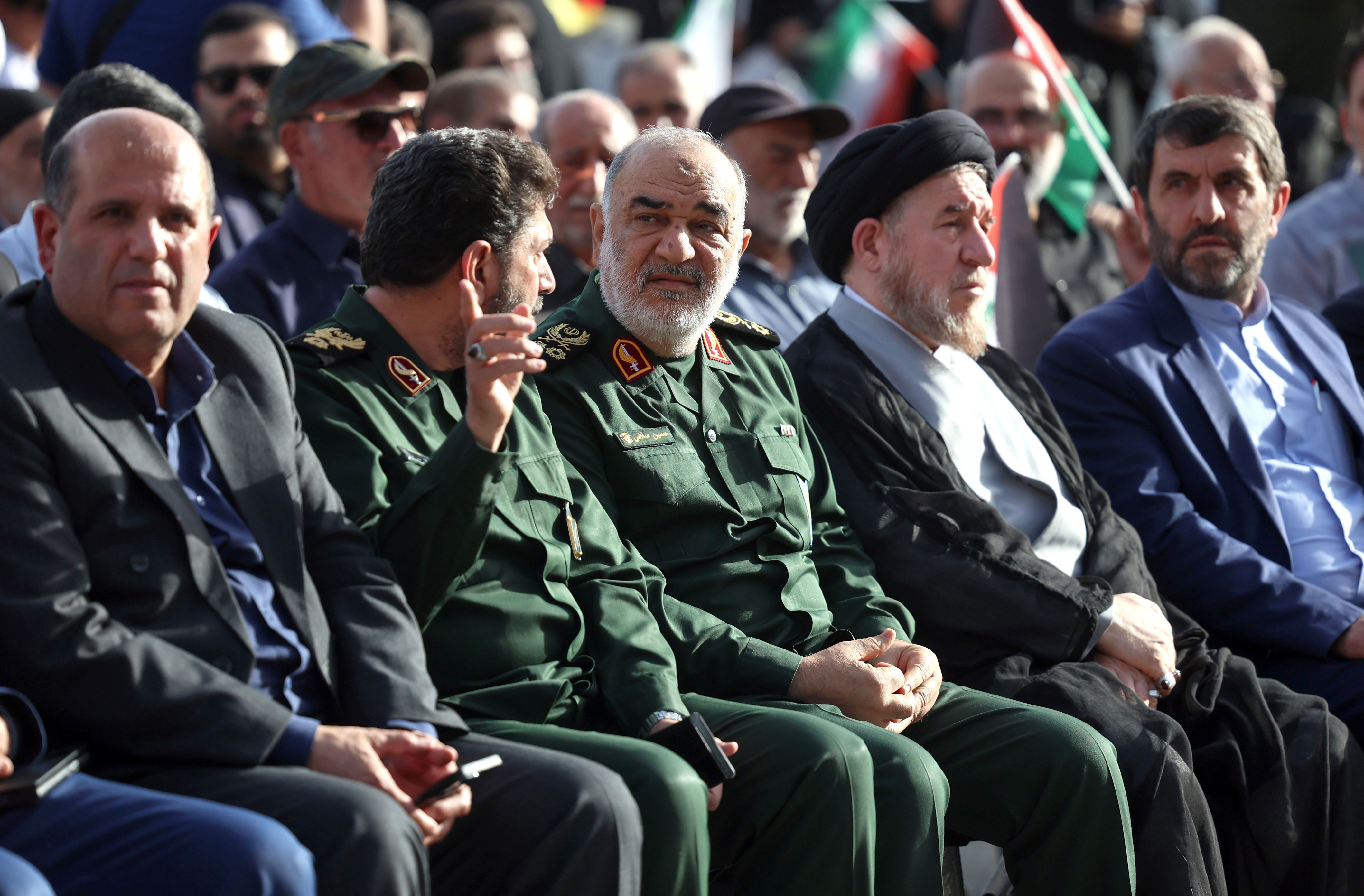
Iran’s semiofficial Tasnim News Agency confirmed the deaths of prominent military commanders and nuclear scientists in Israel’s strikes.
It reported that Maj. Gen. Hossein Salami, commander of the Islamic Revolutionary Guard Corps, was killed, along with another senior IRGC commander, Maj. Gen. Gholam Ali Rashid.
The agency also reported the deaths of Mohammad Mehdi Tehranchi and Fereydoon Abbasi, whom the agency identified as “two prominent Iranian nuclear scientists.”
Mehr News Agency Arabic, another semiofficial Iranian agency, reported that Maj. Gen. Mohammad Bagheri, chief of staff of the armed forces, was also killed in the strikes.
By: Mohamad El Chamaa
12:15 AM: Iranian nuclear site deep underground may be key to Israel’s success
Israel’s military struck a dizzying array of targets in Iran on Friday, in a long-planned strike apparently aimed both at decapitating the leaders of Iran’s military and nuclear programs and neutralizing what Israel sees as an existential threat.
But the fate of one of Iran’s most important sites for enriching uranium — the facility at
Fordow
, buried deep underground — remains unclear. Hidden by Iran in a mountain near the holy city of Qom until it was discovered by Western intelligence agencies in 2009, the facility is seen as a key node in Tehran’s nuclear infrastructure and one of the hardest to dismantle.
Current and former U.S. officials have said that Israel would need both U.S.-supplied earth-penetrating munitions and in-air refueling for its fighter aircraft to disable the thousands of centrifuges enriching uranium at Fordow. If the facility is not eliminated, they said, the setback to Iran’s nuclear program is likely to prove temporary.
By: Warren P. Strobel
12:14 AM: Images appear to show extensive damage to building in northern Tehran
Videos and photos verified by The Washington Post appeared to show extensive damage to the top of a landmark tower near Vanak Square in northern Tehran. In one video filmed at night, smoke can be seen coming from the top of One Holding Tower. Photos taken the following morning show numerous glass windows blown out.
By: Evan Hill
12:00 AM: Analysis from Yeganeh Torbati, Economic policy reporter
Iran’s supreme leader, Ayatollah Ali Khamenei, said Friday morning in a statement that Israel “must expect a severe punishment” for its attacks on Iran. He said some military commanders and scientists were killed in the attacks. Israel has created a “bitter and painful fate” for itself, the statement said.
11:50 PM: IAEA says Natanz nuclear facility among Israel’s targets
The International Atomic Energy Agency is “closely monitoring” the situation in Iran, the nuclear watchdog’s director general, Rafael Mariano Grossi, said in a statement. He said the Natanz nuclear facility in central Iran was among the targets of Israel’s strikes.
“The Agency is in contact with Iranian authorities regarding radiation levels. We are also in contact with our inspectors in the country,” Grossi said.
Iran’s semiofficial Mehr News Agency earlier shared
video
that it said showed smoke billowing from the Natanz facility.
Earlier on Thursday, the IAEA’s Board of Governors adopted a resolution declaring that
Iran was in breach of its nuclear nonproliferation obligations
for the first time in 20 years. Tehran condemned the resolution, calling it politically motivated, and announced plans to open a new uranium enrichment site.
By: Erin Cunningham and Mohamad El Chamaa
11:48 PM: Photos and videos show damage in Tehran neighborhood
Firefighters work at the scene of an explosion at a residential compound in northern Tehran on Friday.
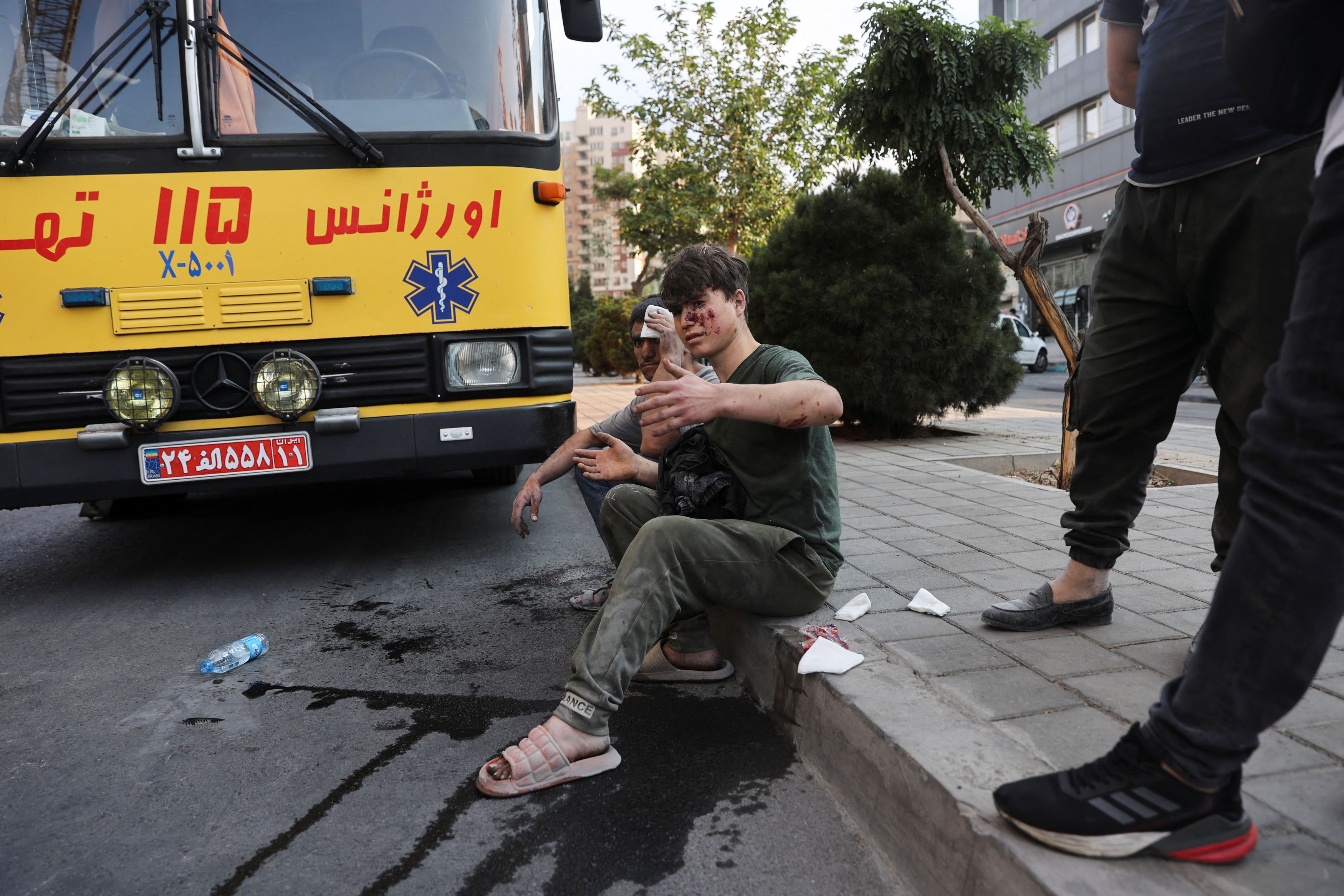
An injured person sits on the roadside in the aftermath of Israeli strikes.
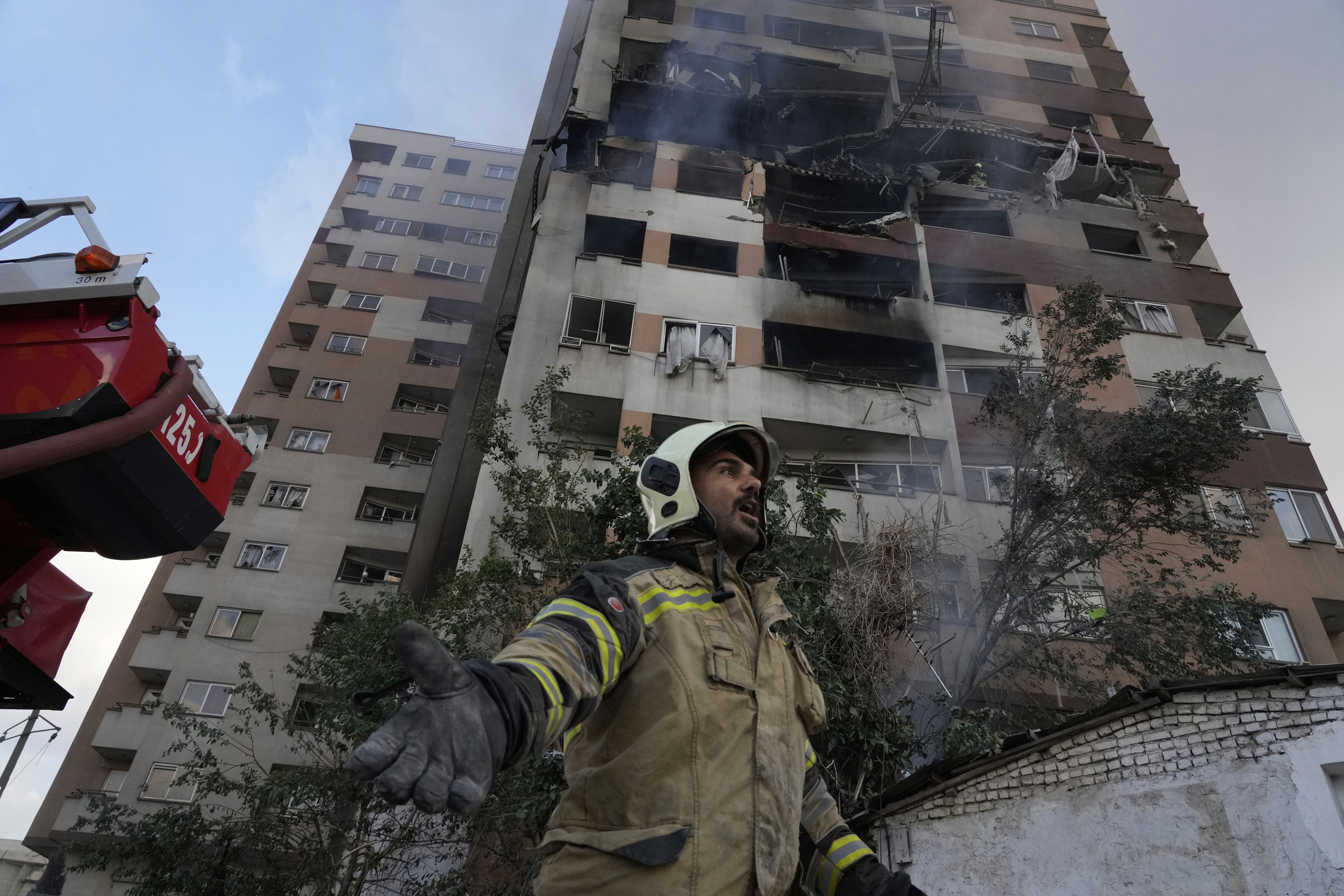
A firefighter calls out to colleagues at the scene of an explosion at a residential compound in northern Tehran.
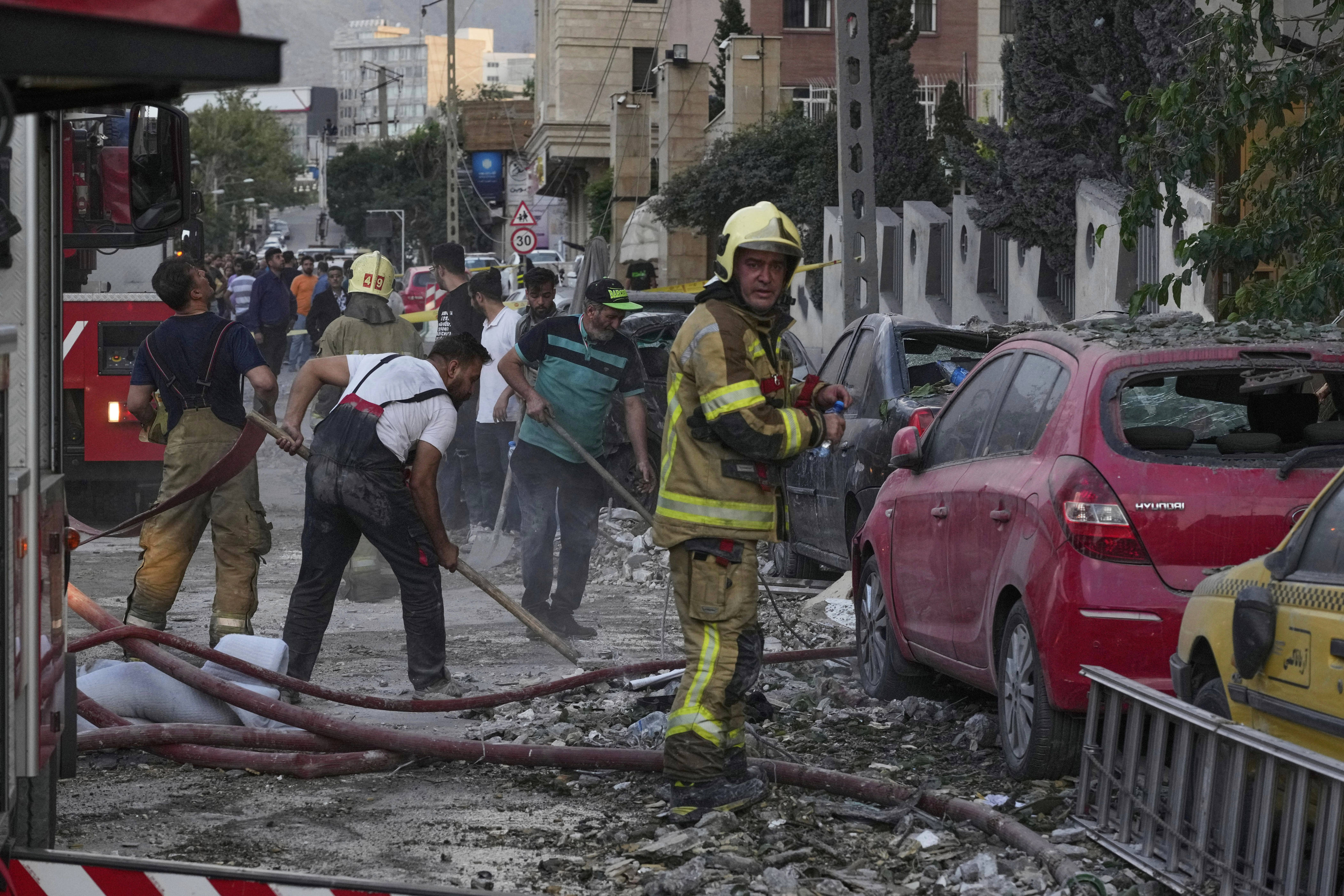
Firefighters and others clean up the scene of an explosion.
By: Washington Post staff
11:42 PM: Israel and U.S. must pay ‘heavy price’ for attacks, Iranian military spokesman says
The spokesman for Iran’s armed forces, Abolfazl Shekarchi, said on Iranian television that Israel and the United States “must pay a very heavy price, and they will, God willing, receive a very forceful slap” for the Israeli strikes on Iran.
“The Zionist enemy, with the support and likely direct aid of the United States, took this painful action, which unfortunately targeted many residential areas in the country,” he said.
Shekarchi added that the homes of some officials and military commanders had been targeted, and that some of them had died.
“The armed forces are on the job, and everyone is ready,” he said.
By: Yeganeh Torbati
10:51 PM: Analysis from Alon Rom
Israeli Defense Minister Israel Katz told the Israel Defense Forces General Staff Forum before the strikes began that he had “defined the thwarting of Iran’s nuclear program as my top priority” since
taking office
late last year. “Over the past year and a half, we’ve dealt with Iran’s proxies,” he said, a reference to militant groups Hamas in Gaza, Hezbollah in Lebanon and the Houthis in Yemen. “Now, we are dealing with the snake’s head itself.”
10:41 PM: Analysis from Michael Birnbaum, White House correspondent covering the Trump presidency and foreign policy
President Donald Trump will convene his top security officials for a meeting of the U.S. National Security Council in the Situation Room at 11 a.m. Eastern time on Friday, the White House said late Thursday.
10:24 PM: Analysis from Alon Rom
Tel Aviv, Israel’s commercial capital, was busy preparing for its annual Pride parade, with clubs and bars packed early on Friday, when sirens sounded across the city and a message from the Home Front Command announced the start of the attack on Iran. The bars immediately shut down and Friday’s parade was canceled.
10:22 PM: Analysis from Adam Taylor, National Security reporter with a focus on the State Department
Israel’s national airline, El Al,
said
it was suspending flights to and from the country due to “recent security developments” and the closure of Israeli airspace. El Al has
largely kept flying
despite recent conflicts in the region.
10:18 PM: Analysis from Washington Post staff
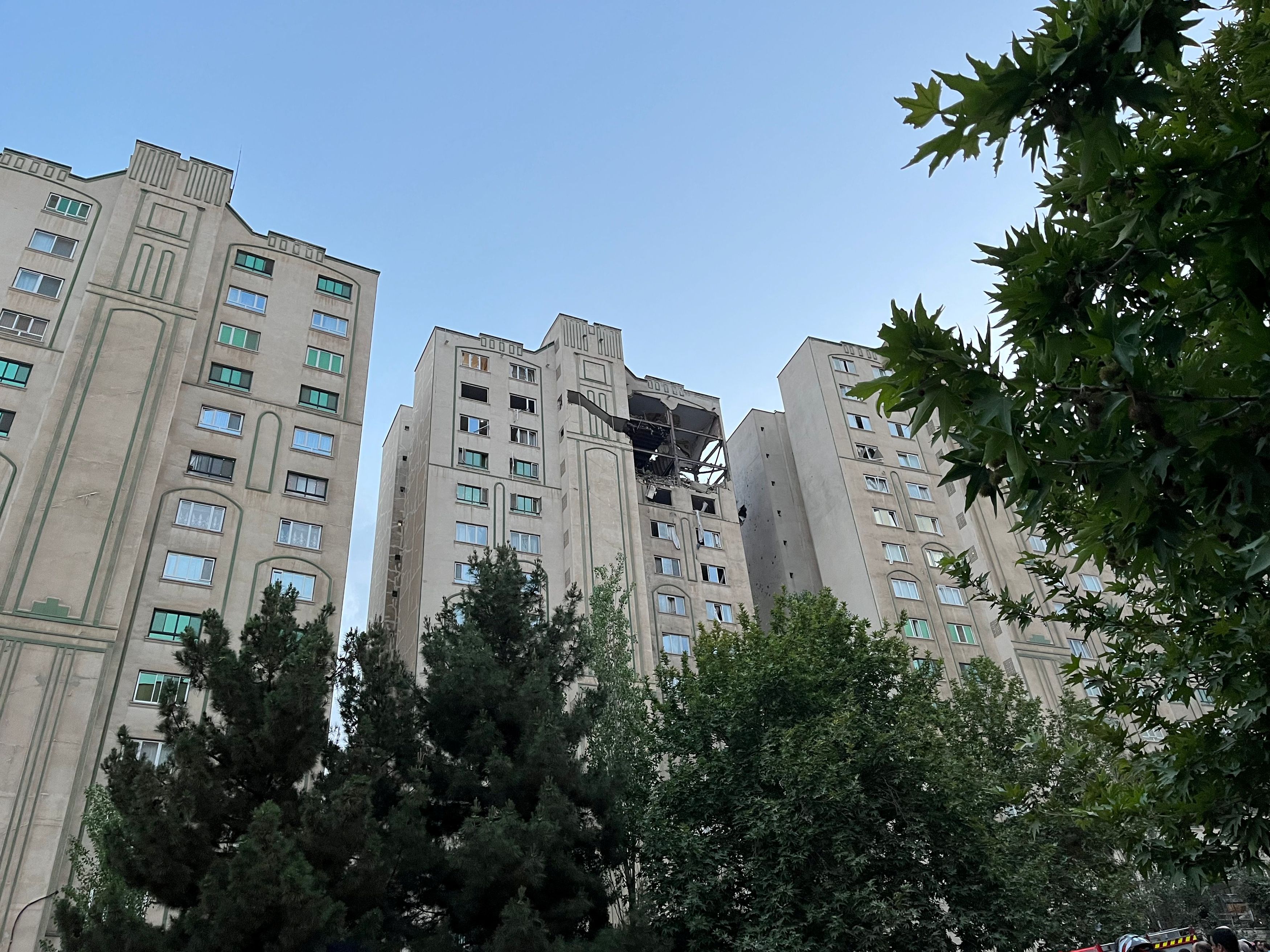
Damage to a building in Tehran following Israeli strikes early Friday.
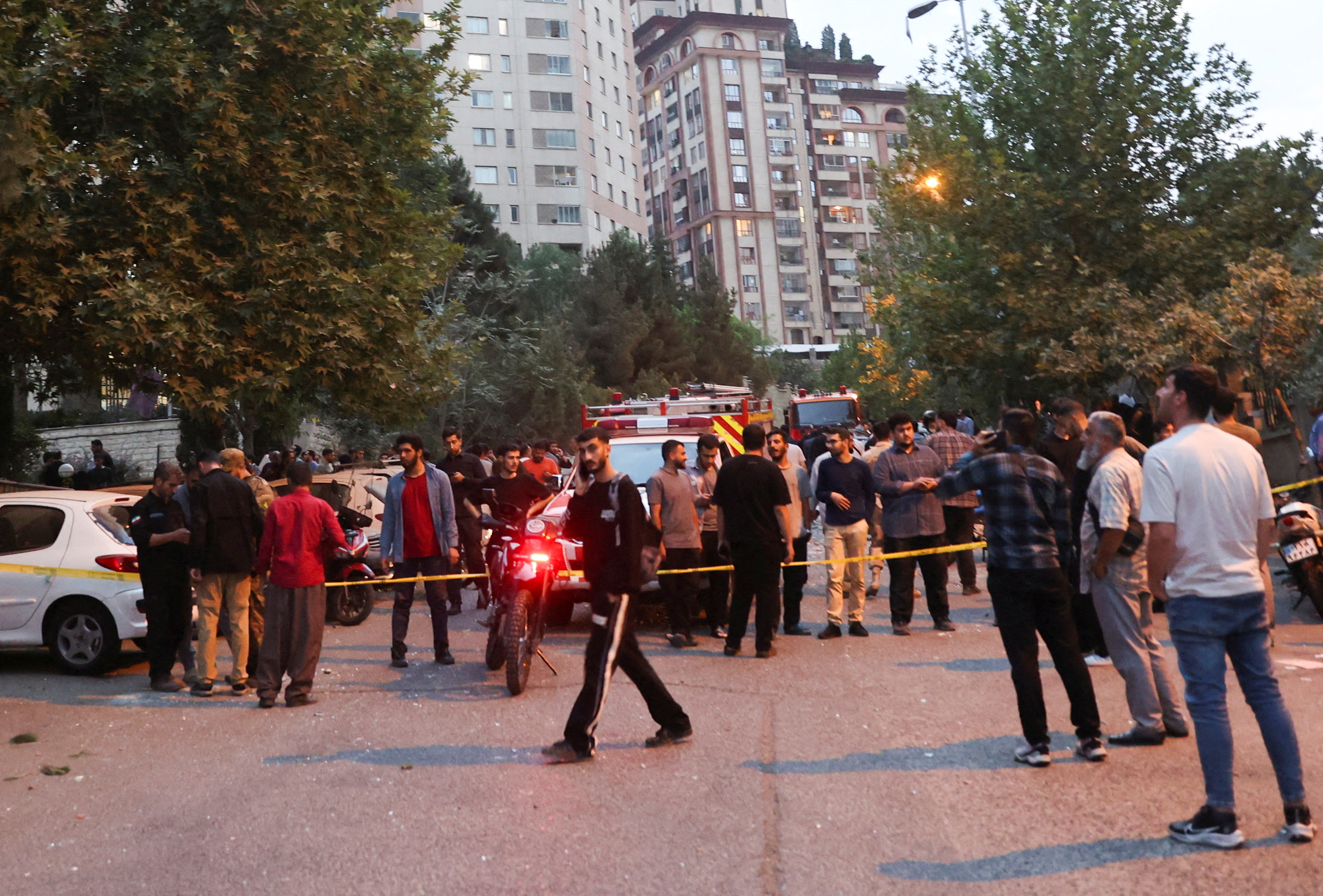
People gather in the street in Tehran early Friday in the aftermath of Israeli strikes.
10:01 PM: Analysis from Susannah George, The Persian Gulf
Iran’s Press TV aired initial reports that the Israeli strikes in and around Tehran have resulted in civilian casualties. The state-run broadcaster said the Israeli attacks also struck sites in Natanz, where Iran has a nuclear site, and in Khorramabad, in western Iran, home to a large missile base.
10:01 PM: Analysis from Mustafa Salim, Foreign reporter focusing on Iraq
The sounds of explosions and booms have been heard in the skies over Baghdad and several Iraqi provinces. An Iraqi security official, who spoke on the condition of anonymity because he was not authorized to speak to the media, said the sounds were the result of Israeli aircraft breaching Iraqi airspace and launching missiles.
9:44 PM: Israel’s military says it struck dozens of targets in Iran
Israel’s military said that Israeli air force jets carried out strikes on dozens of Iranian military targets early Friday, in an effort to disrupt Iran’s nuclear program.
The Israel Defense Forces said in a statement that Iran is “closer than ever to obtaining a nuclear weapon,” which it said would be an “existential threat” to Israel, adding that it would “continue to act as required” against such threats.
“The IDF launched a preemptive, precise, combined offensive based on high-quality intelligence to strike Iran’s nuclear program, and in response to the Iranian regime’s ongoing aggression against Israel,” the IDF said.
Tehran had threatened to respond to an Israeli attack with counterstrikes targeting both Israel and U.S. forces, and facilities scattered throughout the Middle East.
The IDF said Friday it had “prepared for a wide range of scenarios in defense and offense that may be needed.”
Israeli Defense Minister Israel Katz earlier declared a “special emergency situation” in Israel in anticipation of a potential retaliatory attack.
By: Rachel Pannett
9:40 PM: Analysis from Yeganeh Torbati, Economic policy reporter
Mohammad, who lives near the Shahid Mahallati neighborhood in east Tehran, was at home when he heard a plane fly by at a very low altitude. He walked out to his terrace and saw what he said were 10 to 12 explosions in the area. Mohammad, who spoke on the condition that only his first name be used for security reasons, heard the sound of planes for about an hour after that.
9:33 PM: Netanyahu says Israel targeted Iran’s leading nuclear scientists
In a video statement released early Friday, Israeli Prime Minister Benjamin Netanyahu announced Operation “Rising Lion.”
“We struck at the heart of Iran’s nuclear enrichment program,” he said. “We struck at the heart of Iran’s nuclear weaponization program. We targeted Iran’s main enrichment facility in Natanz. We targeted Iran’s leading nuclear scientists working on the Iranian bomb. We also struck at the heart of Iran’s ballistic missile program.”
He said Israel was acting to protect its Arab neighbors, as well as the Western world and the United States, and thanked President Donald Trump — who has stated his preference for a negotiated deal — for his “leadership in confronting Iran’s nuclear weapons program.” But, Netanyahu said, “the hardest decision any leader has to make is to thwart a danger before it is fully materialized.”
By: Gerry Shih
9:24 PM: Analysis from Susannah George, The Persian Gulf
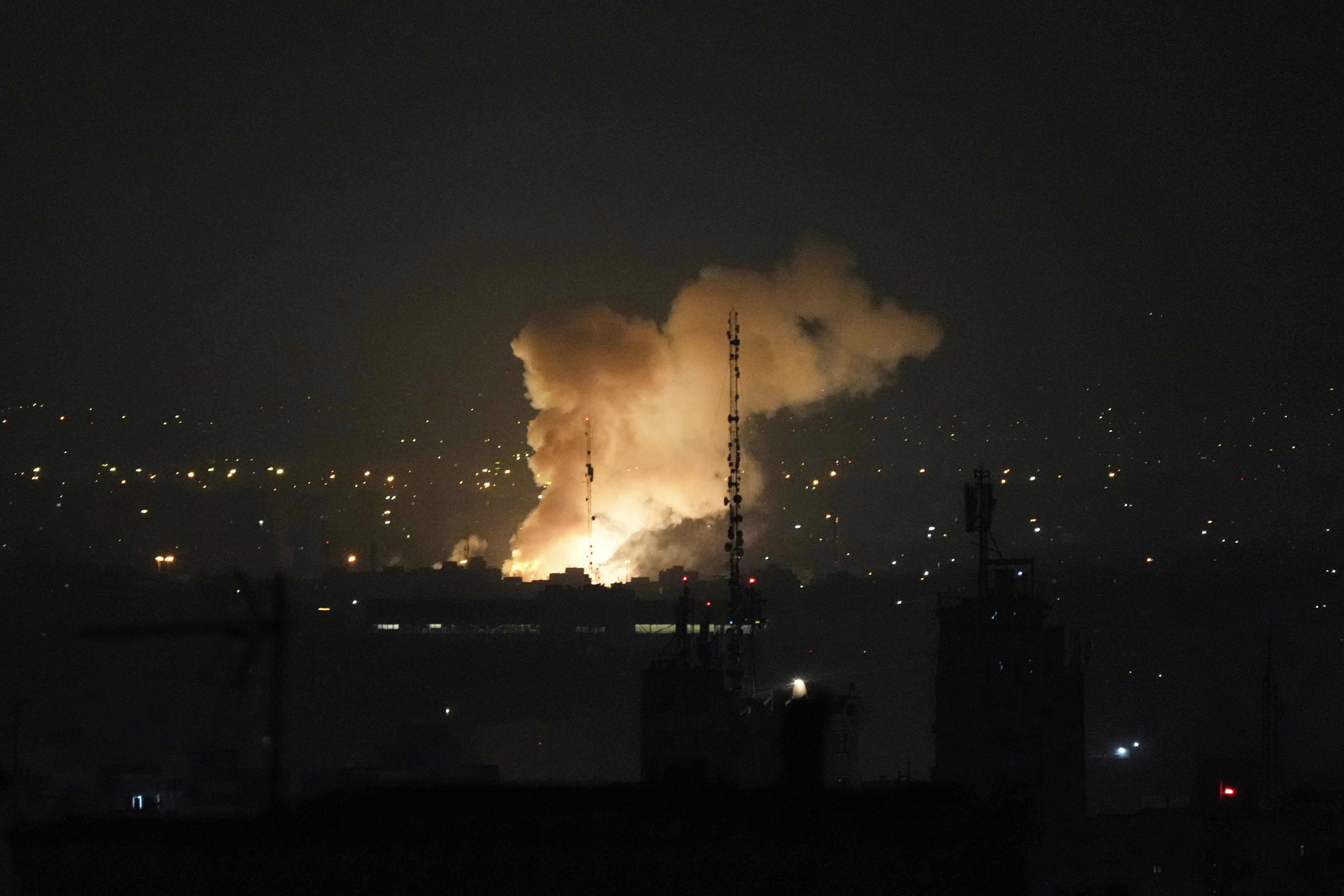
Explosions could be heard in the Iranian capital, Tehran, from about 3:20 a.m., according to a report by the Islamic Republic News Agency (IRNA), the state broadcaster.
The explosions could be heard in the city’s eastern, western and central neighborhoods, with reports that those in the east were the most intense, according to the IRNA. Images shared on social media and messaging applications showed flashes of light above the darkened skyline.
9:21 PM: Analysis from Lior Soroka
Israel Defense Forces spokesperson Effie Defrin said in
a recorded statement
that intelligence in recent months “has shown that Iran is closer than ever to obtaining a nuclear weapon.” He added that the IDF’s strikes targeted the Iranian nuclear program to prevent “the Iranian regime’s ability to build a nuclear bomb in the immediate time frame.”
9:16 PM: Analysis from Yeganeh Torbati, Economic policy reporter
Mahtab, a woman in northern Tehran, said she saw the sky turn red early Friday before she heard the sound of explosions. The windows of her home shook. She could hear planes flying overhead and the sirens of emergency vehicles blaring.
9:10 PM: Analysis from Washington Post staff
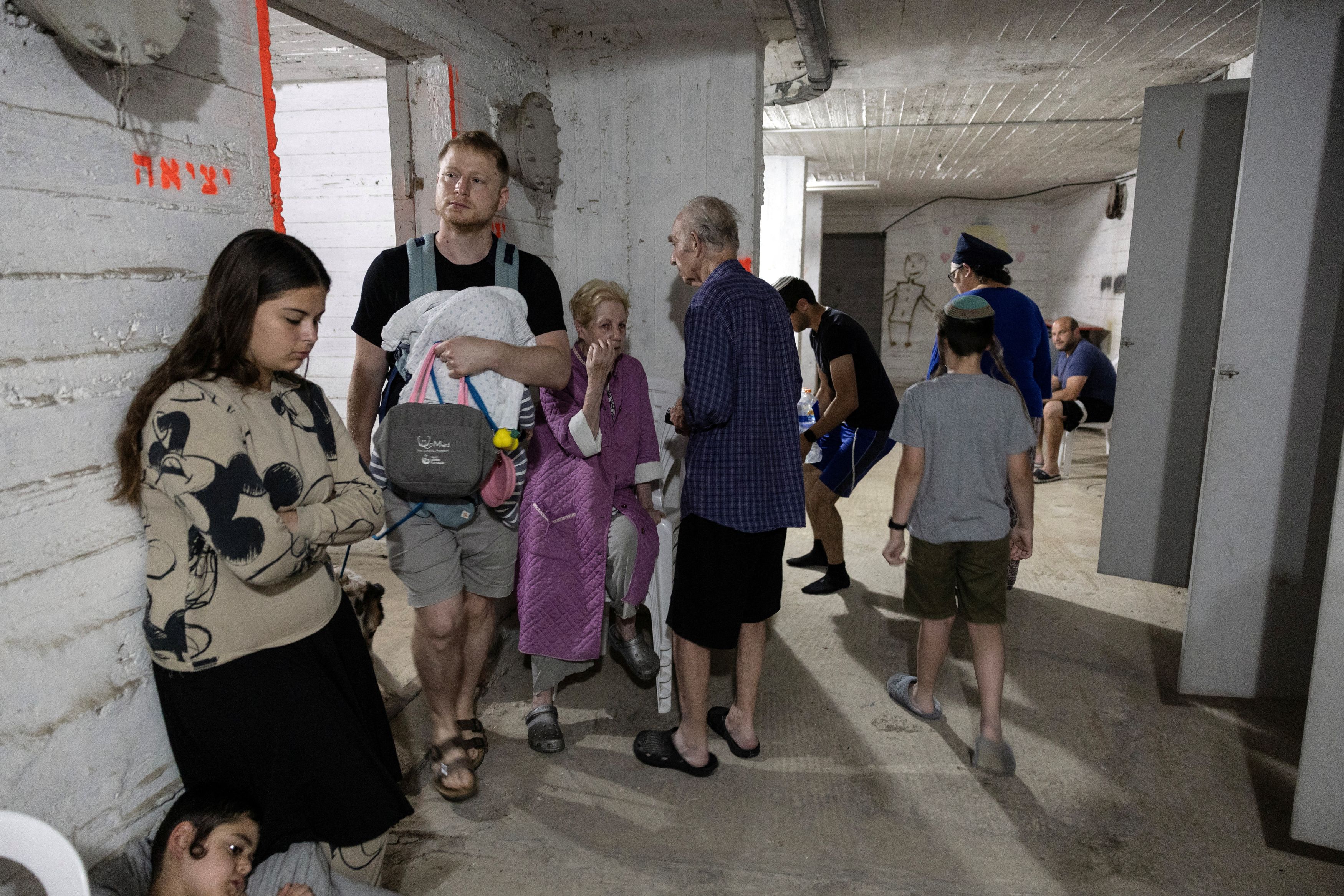
Israelis gather in a shelter following sirens in Tel Aviv early Friday.
9:01 PM: Analysis from Shira Rubin, Foreign reporter, Middle East
“This operation will continue for as many days as it takes to remove this threat,” Israeli Prime Minister Benjamin Netanyahu said early Friday in a video statement published in Hebrew and English. “This is a clear and present danger to Israel’s very survival,” he said, adding that Iran could “produce a nuclear weapon in a very short time. It could be a year. It could be a few months.”
9:00 PM: Rubio says U.S. forces not involved in Iran strikes, warns Iran not to target U.S.
Secretary of State Marco Rubio, in a statement distributed by the White House, confirmed the Israeli attacks against Iran but made clear that there is no involvement by the United States.
“We are not involved in strikes against Iran and our top priority is protecting American forces in the region,” he said. “Israel advised us that they believe this action was necessary for its self-defense.”
He said that President Donald Trump and administration officials were in touch with allies in the region and were taking steps to protect U.S. forces.
“Let me be clear,” he added, “Iran should not target U.S. interests or personnel.”
By: Matt Viser
8:50 PM: Analysis from Alex Horton, National security reporter focused on the U.S. military. Send him secure tips on Signal at alexhorton.85
There was no U.S. involvement or assistance in the strikes, according to a U.S. official who spoke on the condition of anonymity to discuss the ongoing operation. It was not immediately clear whether the United States would participate in defensive strikes such as shooting down Iranian drones or missiles. “That’s up to the president,” the official said.

